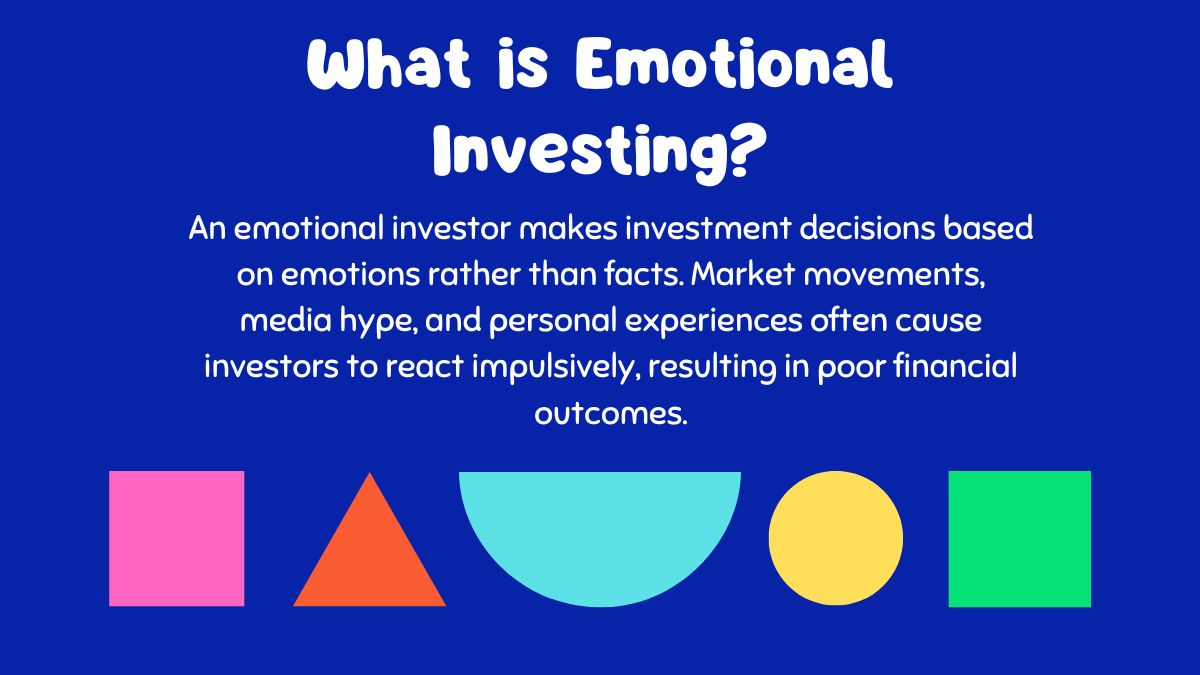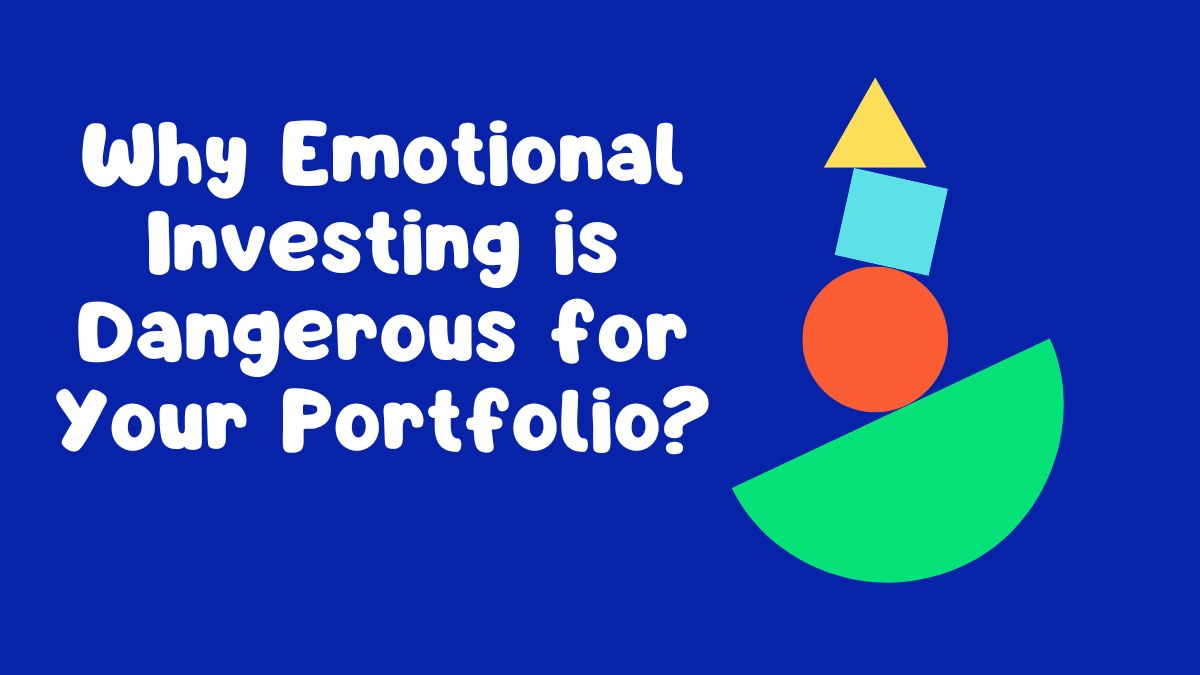Investing is often thought to be a game of numbers, data, and logic. People’s investment decisions are often influenced by their emotions. Investors who invest emotionally let their feelings-such as fear, greed, excitement, or panic-drive their decisions instead of using rational analysis and strategic planning.
It is natural to feel emotions, but they can be hazardous when it comes to managing your investment portfolio. In this blog, we will explore why emotional investing is dangerous, common emotional pitfalls investors face, and how to prevent emotions from ruining your financial future.
What is Emotional Investing?

An emotional investor makes investment decisions based on emotions rather than facts. Market movements, media hype, and personal experiences often cause investors to react impulsively, resulting in poor financial outcomes.
For example:
- A stock surges in price, and an investor buys it out of fear of missing out (FOMO), ignoring its actual value.
- A market crash happens, and an investor panic sells at a loss rather than holding onto quality investments.
- An investor gets attached to a stock because of past gains and refuses to sell, even when fundamentals weaken.
Investors often make inconsistent, short-term, and reactionary investment decisions as a result of these emotional responses, which negatively impacts their long-term wealth.
Why Emotional Investing is Dangerous?
1. Leads to Buying High and Selling Low
When investors invest emotionally, they tend to buy high and sell low, which is the opposite of what successful investors do. When stocks are rising at inflated prices, investors feel confident. When markets fall, fear takes over, and they sell at a loss.
For example, during the 2020 COVID-19 market crash, many investors panic-sold their stocks at low prices. However, the market rebounded quickly, leaving those who sold behind.
2. Impacts Long-Term Investment Strategy
Long-term investing is about patience and consistency. Emotional investors, however, tend to react to short-term market fluctuations. Buying and selling frequently disrupts long-term compounding and reduces overall returns due to frequent buying and selling.
3. Overtrading Increases Costs
As a result of emotional decisions, frequent trading leads to high transaction costs such as brokerage fees, taxes, and slippages. The more an investor trades based on emotions, the more money they lose to these costs, which could have been avoided by following a disciplined investment strategy.
4. Confirmation Bias Leads to Poor Decisions
Many emotional investors suffer from confirmation bias, which means they ignore contradictory data while seeking out information that supports their beliefs. For example, if an investor is emotionally attached to a stock, they may ignore negative news about the company and hold on to it longer than necessary.
5. Creates Stress and Anxiety
Constantly checking stock prices, reacting to news, and making impulsive decisions can lead to high levels of stress and anxiety. A mental toll is taken by emotional investing and may lead to even worse decisions.
Also Read:
- How Inflation Affects Your Investments: What You Need to Know
- Mutual Funds vs. Direct Stocks: A Comparative Analysis
Common Emotional Traps in Investing
1. Fear and Panic Selling
When the market falls, fear causes investors to sell their investments prematurely, locking in losses instead of waiting for a recovery.
2. Greed and Overconfidence
When markets are booming, greed drives investors to buy risky stocks or invest heavily in speculative assets without proper research.
3. Loss Aversion
Investors hate losing money more than they enjoy making money. As a result, they may hold onto losing stocks for too long, hoping for a rebound, even when the fundamentals suggest otherwise.
4. FOMO (Fear of Missing Out)
Seeing others make quick profits can cause investors to jump into investments without proper analysis, often leading to losses.
5. Herd Mentality
Investors tend to follow what others are doing, assuming that the crowd is making the right decisions. This often leads to bubbles and crashes, as seen in the dot-com bubble and cryptocurrency booms.
How to Avoid Emotional Investing?
1. Have a Clear Investment Plan
Define your financial goals, risk tolerance, and investment strategy. Having a plan reduces the chances of making impulsive decisions based on emotions.
2. Stick to Asset Allocation
Diversification helps reduce risk. Sticking to a well-planned asset allocation strategy prevents overexposure to high-risk investments.
3. Use a Long-Term Approach
Ignore short-term market fluctuations and focus on long-term wealth creation. Markets will always go through ups and downs, but a disciplined investor remains focused.
4. Automate Investments
Systematic Investment Plans (SIPs) in mutual funds help investors avoid emotional decision-making by automating regular investments.
5. Limit Market Monitoring
Checking stock prices every day increases emotional involvement. Limiting screen time can help investors stay rational and avoid unnecessary trades.
6. Seek Professional Advice
If emotions are influencing your decisions, consider consulting a financial advisor. A professional can provide an objective perspective and keep you on track with your financial goals.
FAQs
1. Why do people make emotional investment decisions?
Investing involves money, which is tied to personal security and aspirations. Fear, greed, and excitement often override logical thinking, leading to emotional investment decisions.
2. What are the most common emotional mistakes investors make?
The most common mistakes include panic selling, chasing hot stocks, overtrading, holding onto losing stocks due to loss aversion, and following the herd mentality.
3. How can I control my emotions while investing?
Develop a long-term investment strategy, automate your investments, avoid checking stock prices frequently, and seek professional financial advice when needed.
4. Is it bad to be emotionally attached to a stock?
Yes, emotional attachment to a stock can prevent investors from making rational decisions. If the company’s fundamentals weaken, it is important to sell rather than hold onto it due to emotional reasons.
5. How does emotional investing impact portfolio performance?
Emotional investing often leads to impulsive decisions, increasing losses, trading costs, and missed opportunities. It disrupts the long-term wealth creation process and adds unnecessary stress.
6. What is the best way to avoid panic selling?
Understand that market corrections are normal. Having an emergency fund, diversifying investments, and sticking to a well-defined strategy can prevent panic selling during downturns.
Conclusion
Emotional investing is one of the biggest threats to building long-term wealth. Emotions are natural, but allowing them to dictate investment decisions can result in financial losses. It is possible for investors to achieve financial success and protect their portfolios by developing a disciplined investing approach, focusing on long-term goals, and avoiding emotional traps.
If you want to build a strong portfolio, make decisions based on logic, not emotions. Stay patient, stay informed, and most importantly—stay disciplined in your investing journey!

